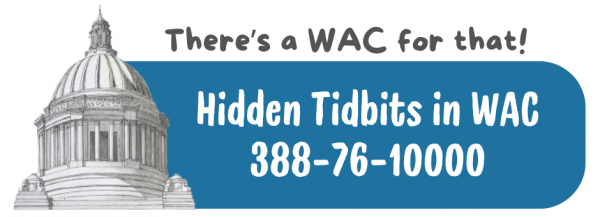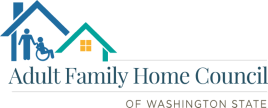
There's a WAC for That!
Hidden Tidbits in WAC 388-76-10000
Welcome to the latest edition of “There’s a WAC for That,” where we uncover the hidden gems within Washington Administrative Code (WAC) 388-76-10000 – Definitions. This section is packed with crucial definitions that shape the care and protection of vulnerable adults in adult family homes. Let’s dive into some key highlights:
Abandonment and Abuse
- Abandonment: This term refers to the failure of a caregiver to provide necessary essentials like food, clothing, shelter, or healthcare to a frail elder or vulnerable adult.
- Abuse: Defined as willful actions or inactions causing injury, confinement, intimidation, or punishment. Abuse can be physical, mental, sexual, or involve personal exploitation and improper use of restraints.
Types of Abuse
- Sexual Abuse: Includes any nonconsensual sexual conduct, from inappropriate touching to sexual harassment.
- Physical Abuse: Encompasses actions like striking, slapping, or choking.
- Mental Abuse: Involves verbal or nonverbal actions that threaten, humiliate, or isolate a vulnerable adult.
- Personal Exploitation: Forcing a vulnerable adult to act against their will or perform services for another’s benefit.
- Improper Use of Restraint: Using restraints inappropriately for convenience or discipline, which is not medically authorized.
Adult Family Homes (AFHs)
- Definition: A residential home licensed to provide care for up to six adults, or up to eight with special approval. These homes offer personal and special care, room, and board.
- Entities: Includes corporations, partnerships, and LLCs licensed to operate these homes.
Key Terms
- Resident: Any adult living in an AFH who receives care and is unrelated to the provider.
- Staff: Individuals employed or contracted to provide care and services in an AFH.
- Vulnerable Adult: Persons aged 60 or older, those with disabilities, or those receiving specific services who cannot care for themselves.
Important Concepts
- Severity and Seriousness: Violations are assessed based on the actual or potential harm to residents.
- Significant Change: Any lasting change in a resident’s condition that requires a new assessment or care plan.
Stay tuned for more insights in our next edition of “There’s a WAC for That,” where we continue to explore the intricacies of WAC regulations and their impact on adult family homes. Until then, stay informed and stay safe!
Not a Member Yet?
Membership fees enable the Council to cover legal expenses and fund staff to advocate with the state and regulatory agencies. The participation of every adult family home is vital to ensuring fair regulations and rates that accurately reflect the costs of caring for our vulnerable adults. Consider becoming a member of the Council to help us continue improving conditions for all adult family homes in Washington State.

